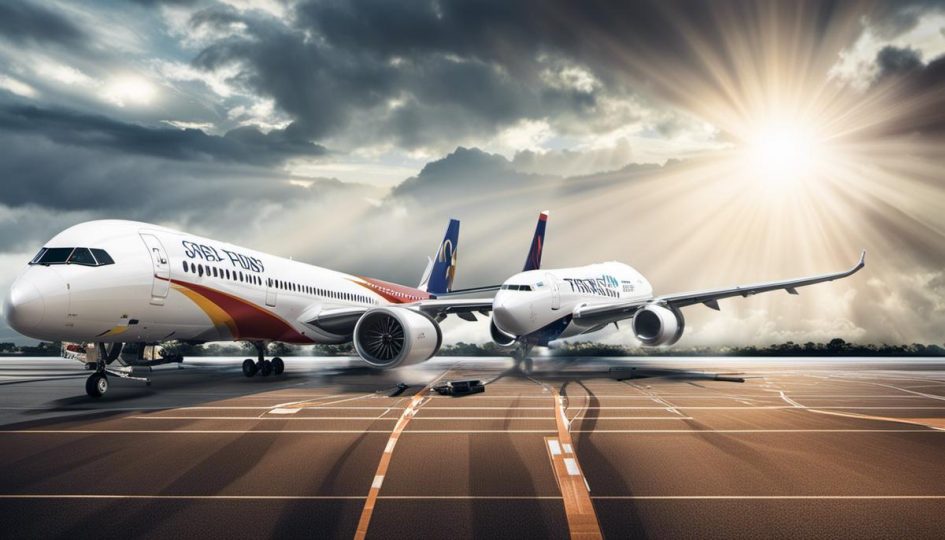The realm of travel encompasses a myriad of adventures and experiences, painting memories of a lifetime. Yet, like any other field, it does come with its own set of challenges that can significantly impact both individuals and institutions.
The common travel issues range from those predictable to the unpredicted, each posing a unique level of difficulty and stress. By delving deeper into the understanding of these difficulties, assessing their impact, and probing possible preventive measures, we learn to better manage them, transforming roadblocks into opportunities.
Moreover, our journey of exploration is enriched with real-life case studies that shed light on effective strategies to face travel complications.While the travel landscape is rapidly evolving, so are the methods by which we address associated difficulties. Our seamless transitions into future trends will show how innovative technology, global collaboration, and well-informed policies are weaving together to redefine our responses.
Understanding the Common Travel Difficulties
Understanding Travel Delays
Travel delays are one of the most common difficulties faced by travelers. These delays can occur due to several factors such as extreme weather conditions, security concerns, technical issues with transport vehicles, congested traffic routes, or strikes and other labor disagreements. Major transport hubs like airports and railway stations frequently experience significant delays, impacting individuals’ trip schedules and sometimes even leading to trip cancellations. The Bureau of Transportation Statistics reported that in 2019, around 17% of all flights in the U.S. were delayed.
Language Barriers and Travel
Language barriers pose another common travel difficulty. If travelers do not understand the language of their destination, it may lead to misunderstandings, inconvenience, and even risky situations. According to Ethnologue, there are 7,139 living languages in the world, making the possibility of language barriers a frequent concern for many travelers. As a result, many people now take language classes, use translation apps, or hire local guides to mitigate language issues while traveling.
Cultural Differences and Travel
Different cultures have varying customs, traditions, and social norms, which can sometimes lead to discomfort, confusion, or misunderstanding for travelers. These cultural differences can cover anything from meal times and tipping etiquette, to more significant issues like dress norms and social behaviors. The World Values Survey, which covers 80 societies containing 90% of the world’s population, indicates that cultural differences between countries and regions remain significant.
Health-Related Travel Difficulties
Health-related issues are another common concern for travelers. The change in food, water, climate, and jet lag can take a toll on a person’s health, often resulting in ailments like traveler’s diarrhea, respiratory problems, or skin issues. According to the Centers for Disease Control and Prevention (CDC), about 30-70% of travelers experience health-related issues during their trips.
Other Travel Difficulties
Travelers may also face difficulties related to theft or loss of belongings, fraudulent travel offers, accommodation or service issues, and visa or passport problems. Safety is a significant concern, especially for solo travelers and women. According to the Global Peace Index, safety varies substantially between countries and regions, emphasizing the importance of understanding local security levels and laws before commencing travel.
To conclude, anticipating typical travel difficulties aids in enhanced preparation and devising efficient problem-solving strategies, consequently making travel experiences both safer and more pleasant. Whether it means packing extra travel adapters or familiarizing oneself with local customs and norms, these seemingly small steps can extensively shield your journey from the potential impact of such challenges.

Photo by lucabravo on Unsplash
Impact of Travel Difficulties
Financial Repercussions of Travel Difficulties
Travel complications inevitably result in monetary losses on both an individual and corporate level. Unexpected issues such as flight cancellations, problems with accommodations, and travel documentation complications can culminate in extra expenses and loss of revenue. When a business trip is delayed or cancelled, it not only results in the immediate financial loss of spent airfare and accommodations, but could also lead to potential long-term losses. For instance, the loss of potential business opportunities and strained relationships due to missed or postponed meetings can have significant financial implications.
Psychological Impact of Travel Difficulties
The psychological impact of travel difficulties is another significant concern. The stress and anxiety associated with travel problems can affect an individual’s mental health. The uncertainty and frustration resulting from such difficulties often lead to elevated stress levels, which can have both immediate and lingering psychological effects. Moreover, frequent travelers, such as business executives, may experience burnout due to regular exposure to these stressors.
Travel Difficulties and Productivity
Productivity, whether personal or professional, is also adversely affected by travel difficulties. In a business context, disrupted travel plans can lead to lost work hours and decreased output. It can delay critical projects, meetings, or deals and undermine the effectiveness of a business trip. On a personal level, delayed or disrupted vacations can lead to frustration and a lack of relaxation, negating the very purpose of the holiday.
Travel Difficulties Disrupting Schedules
One of the most visible impacts of travel difficulties is the disruption of schedules. Delays in air travel can create a domino effect, potentially affecting various aspects of an individual’s itinerary or a business’s operations. This can lead to missed meetings, scheduling conflicts, and added costs. Furthermore, the time expended in addressing and rectifying these issues can further skew schedules and plans.
Impact on Businesses
Businesses, particularly those dependent on frequent travel, are often severely impacted by travel difficulties. Beyond the immediate financial cost, these challenges can have a long-term impact on business relationships, deadlines, and overall performance. Businesses may lose credibility with clients or partners due to missed appointments or delayed deliveries. Moreover, the additional time and resources expended on dealing with travel issues can detract from a company’s core activities and goals.
Personal Impact of Travel Difficulties
The impact of travel difficulties extends beyond monetary loss and disrupted schedules. It also bears strongly on the personal life of the individual. Multiple encounters with travel difficulties can make the person apprehensive about future travel plans, thereby impacting their lifestyle choices and personal happiness. This fallout can range from minor inconveniences to notable life disruptions, impacting one’s quality of life.
Understanding Travel Difficulties
Travel difficulties represent a considerable concern due to their breadth of tangible and intangible impacts, which can be felt immediately and have long-term effects. These impacts translate into financial losses, mental strain, reduced productivity, schedule disruptions, and negative personal experiences, affecting both individuals and businesses severely. Given this, achieving a mastery of the challenges connected to travel – and developing effective means to mitigate them – is a fundamental aspect in both professional and personal spheres.

Preventive Measures*
Proper Planning: The Key to Smooth Travel
Effective planning lies at the heart of mitigating travel difficulties. Conducting comprehensive research about the destination is a critical part of this process, as it allows travelers to familiarize themselves with local customs, laws, and less crowded periods when costs can be minimized. Planning should cover every aspect of a trip, from transportation and accommodations to food options and contingency plans for emergencies. Gaining detailed insights about the available local transport, accommodations tailored to personal preferences, and restaurants that serve both local and preferred food can go a long way in reducing the chances of encountering issues during travel.
Role of Technology in Easing Travel Difficulties
With the advent of technology, travel planning has become easier and more efficient. From booking flights to navigating through unknown territories, there are applications and services designed to help you every step of the way. GPS-based navigation apps, language translators, online booking platforms, local transport apps, among several others, have made foreign travel relatively hassle-free and spontaneous. The use of digital currencies and online payments can reduce the need to carry excess cash, offering safe and convenient transactions. Wifi and mobile data availability ensure constant connectivity, providing easy access to information and communication.
Respect Local Customs and Traditions
Awareness about local culture, customs, and rules is vital in preventing misunderstandings, disrespect, or even legal issues. This could imply adhering to dress codes in religious places, or not photographing certain monuments or people without permission. Understanding and adhering to local laws, cultural norms, and etiquettes will enhance the travel experience and could even encourage local residents to be more hospitable and helpful.
Health Precautions to Prevent Travel Difficulties
Health precautions assume enormous importance while traveling, especially to foreign lands. Keeping oneself updated about necessary inoculations and vaccines to prevent local diseases, ensuring adequate supply of prescribed medicines, maintaining hygiene and cleanliness can prevent health-related travel difficulties. Access to potable water and food safety should also be kept in mind as they vary largely across the globe, and negligence can lead to severe health issues.
Emergency Preparedness and the Art of Dealing with the Unexpected
Inherent with travel are unforeseen circumstances that can compromise the entire journey. Having a plan to handle such circumstances can avoid panic and enable appropriate action. This could include basic knowledge of first aid, having emergency phone numbers at hand, backups for monetary resources and documents, understanding basic local language for communication, keeping the embassy’s contacts ready, and so on.
Understanding the Value of Travel Insurance
Travel insurance is often an element that slips through the cracks in holiday preparations, yet it’s a cornerstone in alleviating financial strain should unpredictable hardships arise. Offering a plethora of coverage options, including medical emergencies, travel cessation, and compensation for misplaced or damaged luggage, travel insurance represents a financial lifeboat in the face of the unexpected. Thus, it becomes indispensable in ensuring monetary protection, enabling you to effectively manage any complications that may occur while traveling.

Case Studies of Overcoming Travel Difficulties
Case Study 1: Navigating Language Barrier Challenges in Japan
For instance, consider the story of John, an American tourist traveling alone in Japan who encountered significant difficulty due to the language gap. Incapable of speaking or comprehending Japanese, he routinely stumbled with routine tasks like utilizing public transport, ordering meals, and engaging with the local populace.
Nonetheless, John triumphed over these obstacles employing various tactics. He made use of translation apps for text-based translations, such as menus and signs. He also loaded offline language packs on his smartphone to manage conversation with locals. Furthermore, he utilized international SIM cards providing immediate transcription services for telephone conversations. Through his experience, John illustrates how modern-day technology can empower travelers to surmount language barriers, a frequently encountered hurdle in international travel.
Case Study 2: Adaptation to Dietary Restrictions in Spain
Jennifer, a vegan traveler from Canada, experienced difficulties with Spain’s meat-centric culinary culture. In the early days of her trip, she struggled to communicate her dietary preferences to restaurant staff and often found herself inadvertently consuming non-vegan food.
To address this issue, Jennifer started researching and planning her meals in advance. She used online resources to find vegan-friendly restaurants or dishes in Spanish cuisine. Additionally, she downloaded vegan travel apps, which offered a broad network of vegan venues worldwide. Jennifer’s case study underlines the importance of advance planning and utilizing digital resources to overcome food-related travel difficulties.
Case Study 3: Navigating Transport Difficulties in India
The ABC Company planned a corporate trip to India, a country known for its chaotic and dense traffic. The company’s employees, unused to India’s public transport systems and driving norms, found it challenging to commute.
To tackle this issue, the company hired a local travel agency familiar with India’s transport conditions. The travel agency provided private transportation, route planning, and local drivers, significantly reducing the travel difficulties. This case study showcases how hiring local expertise can help navigate unfamiliar environments and efficiently overcome location-specific travel difficulties.
Case Study 4: Managing Trip Disruptions During a Global Pandemic
When the COVID-19 pandemic struck, millions of travelers worldwide faced unprecedented travel difficulties. A family from Germany had to deal with an unforeseen situation when they were holidaying in New Zealand, and the country went into lockdown.
The family overcame the challenge by communicating proactively with their home country’s embassy in New Zealand. They also followed local government and WHO advisories, ensuring their safety while minimizing disruption. This case study highlights the importance of proactive communication, following trusted sources of information, and staying adaptable when facing large-scale travel difficulties.
To wrap things up, real-life case studies have demonstrated that the key to surmounting travel challenges lies in the effective use of technology, detailed preparation ahead of time, tapping into local expertise, and clear, effective communication. Using these strategies, gleaned from actual experiences, can help you manage any travel problems you encounter more effectively.

Future Trends in Solving Travel Difficulties
How Technology is Reshaping Travel: AI and Machine Learning
As technology increasingly permeates every aspect of our lives, it stands to reason that its transformative power will extend to the resolution of travel difficulties. Leading the charge in this area are Artificial Intelligence (AI) and Machine Learning (ML). These technologies promise to simplify a plethora of complex processes, such as itinerary planning, ticket purchasing, and timely diagnosis and resolution of travel-related issues. They can forecast weather patterns, potential flight postponements, road traffic, and even suggest optimal routes to maximize efficiency and prevent problems before they have a chance to arise.
Furthermore, AI chatbots are on hand to offer instantaneous, personalized support to travelers, guiding them through any hurdles they may encounter. Predictive analytics, the offspring of AI and ML, find uses in assessing demand, tweaking pricing to optimal levels, and enhancing the traveler’s experience, thus completely reshaping the travel industry’s landscape. For example, by analyzing historical data alongside current travel conditions, AI can foresee potential issues and propose alternatives, resolving hiccups before they surface.
Global Collaborations in Solving Travel Difficulties
Global collaborations will also play a significant role in addressing travel difficulties in the future. Through collective efforts and data sharing, countries can improve their handling and management of tourism, transportation and immigration matters, leading to fewer travel issues. Global partnerships can lead to the standardization of travel protocols, thereby reducing confusion and misunderstandings, and improving the overall travel experience.
Collaborative digital platforms can provide unified, user-friendly interfaces for travelers to plan, book, and manage their travel. A recent example is the common pass, a global effort to streamline the process of verifying COVID-19 test results and immunization records, which helps to simplify international travel during the pandemic.
Policies to Improve the Travel Experience
Improved policies will be another essential part of alleviating travel difficulties. Governments and relevant bodies must design and implement effective, dynamic policies that can adapt to ever-changing travel trends and challenges. Policies ensuring fair pricing, protecting consumer rights, enhancing security measures and promoting sustainable travel can immensely benefit travelers.
Policies should also focus on inclusivity, ensuring that the benefits of improved travel solutions reach all sections of society. Travel providers must adhere to regulations for passengers with disabilities and should aim to make their services accessible to the unbanked population as well. In terms of international travel, a uniform global visa and immigration policy could help reduce complexities and conflicts.
Adapting to New Norms: Contactless Travel
The recent pandemic has accelerated the need for contactless travel. Going forward, innovations that support contactless and self-service experiences will be pivotal. Biometrics technology, such as facial recognition and fingerprints, is being used to speed up the check-in process and eliminate human contact. Self-service kiosks, mobile apps for ticketing, navigation and payments, and voice-assisted interfaces are some of the innovations making contactless travel a reality.
Overall, the future trends in solving travel difficulties lean heavily on advancements in technology, global collaborations and proactive policy-making. It’s a coordinated push towards a more effective, streamlined and pleasant travel experience for all.

As we traverse the complex world of travel, the role of strategic planning and foresight cannot be overstated. Whether you’re a casual vacationer or a seasoned business traveller, the lessons learned from common difficulties and their impact, preventive measures and their effectiveness, to case studies of resolution, can prove invaluable.
Future trends in technology and policy formation offer a beacon of hope, promising more efficient strategies to counter such challenges. We remember that every travel experience, replete with its hurdles, offers us a chance to learn and evolve, preparing us for a better future, be it on road, on water, or in the air.


Recent Comments